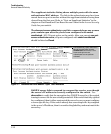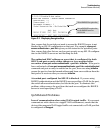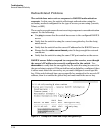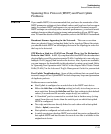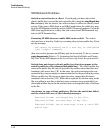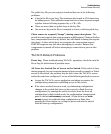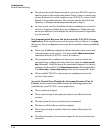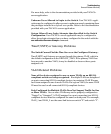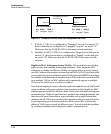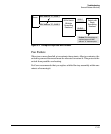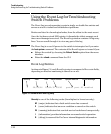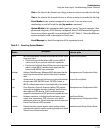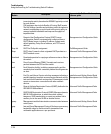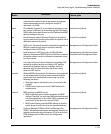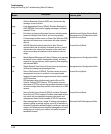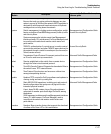
Troubleshooting
Unusual Network Activity
Link supporting VLAN_1
and VLAN_2
Switch “Y”
Switch “X”
Port Y- 7
Port X-3
VLAN Port Assignment
VLAN Port Assignment
Port VLAN_1 VLAN_2
Port VLAN_1 VLAN_2
X-3 Untagged Tagged
Y-7 Untagged Tagged
Figure C-4. Example of Correct VLAN Port Assignments on a Link
1. If VLAN_1 (VID=1) is configured as “Untagged” on port 3 on switch “X”,
then it must also be configured as “Untagged” on port 7 on switch “Y”.
Make sure that the VLAN ID (VID) is the same on both switches.
2. Similarly, if VLAN_2 (VID=2) is configured as “Tagged on the link port on
switch “A”, then it must also be configured as “Tagged” on the link port
on switch “B”. Make sure that the VLAN ID (VID) is the same on both
switches.
Duplicate MAC Addresses Across VLANs. The switches covered in this
guide operate with multiple forwarding databases. Thus, duplicate MAC
addresses occurring on different VLANs can appear where a device having
one MAC address is a member of more than one 802.1Q VLAN, and the switch
port to which the device is linked is using VLANs (instead of MSTP or trunking)
to establish redundant links to another switch. If the other device sends traffic
over multiple VLANs, its MAC address will consistently appear in multiple
VLANs on the switch port to which it is linked.
Note that attempting to create redundant paths through the use of VLANs will
cause problems with some switches. One symptom is that a duplicate MAC
address appears in the Port Address Table of one port, and then later appears
on another port. While the switches have multiple forwarding databases, and
thus does not have this problem, some switches with a single forwarding
database for all VLANs may produce the impression that a connected device
is moving among ports because packets with the same MAC address but
different VLANs are received on different ports. You can avoid this problem
by creating redundant paths using port trunks or spanning tree.
C-20



